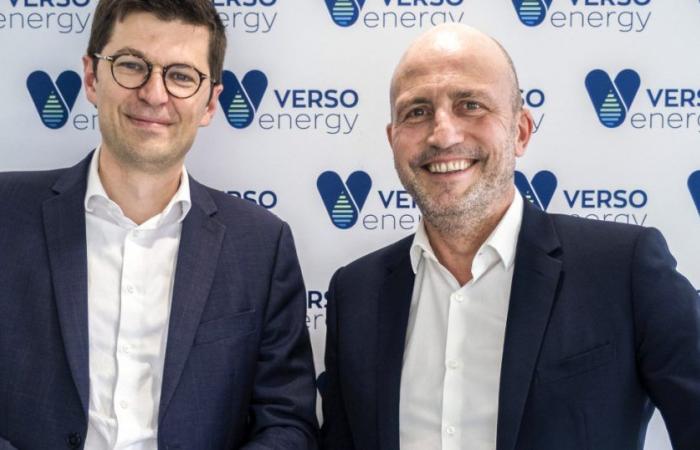For the moment, “only the land is secure”, says Antoine Huard, the general director of Verso Energy. The Parisian industrial start-up has just lifted the veil on a SAF production project for Sustainable Aviation Fuel, which is to be established in the Chavelot Ecoparc, near Épinal, in the Vosges. . The acquisition of 21.5 hectares from SEBL Grand Est, the developer of the activity zone, for 8.6 million euros excluding tax, has been recorded, but remains to be completed “certain feasibility studies before to be able to fully confirm the possibility of moving forward on this project”, indicates Antoine Huard.
Commissioned before 2030
By the end of the year, the general director of Verso Energy believes that all the lights will be green for his Vosges project: a sustainable aviation fuel production plant using the so-called “Methanol-to-Jet” process. “, for a projected investment of one billion euros. At full capacity, the production capacity of the Vosges factory should be between “80,000 and 150,000 tonnes of SAF”, estimates Antoine Huard.
The manager is counting on entry into service in 2029, on the eve of the entry into force of European legislation imposing rules for the use of sustainable aviation fuels, the only technologically accessible avenue for decarbonizing air transport. For synthetic fuels, produced based on hydrogen – i.e. the fuel produced by Verso Energy – airlines will be required to incorporate 1.2% from 2030, then 5% from 2035, and finally 35% from 2050.
Projects all over the world for a nascent market
“It’s a very heavy obligation for airlines,” points out Antoine Huard. “Especially since the penalties will not be discharging.” Concretely, a company which will have paid its penalty in 2030 for non-compliance with commitments will not be exempt from meeting its commitments the following year. According to data from the International Air Transport Association, global requirements were 8 billion tonnes in 2025 and will be 450 billion tonnes in 2050.
“France has an extraordinary opportunity to become a leading country in synthetic fuel which is extremely important for the decarbonization of air transport,” insists Antoine Huard, describing the accelerated development of SAF production projects throughout the planet. “Financing a billion-euro project when you have customers who commit to contracts to buy the production, in this case synthetic fuel, is nothing extraordinary,” assures the general director. from Verso Energy.
Around Norkse Skog, synergies are already operational: it is the paper manufacturer which supplies electricity and steam to Pavatex — Photo: Pavatex – Soprema Group
Four production projects in France
And to establish its position on this emerging market, Verso Energy is carrying out four SAF production projects on French soil. In addition to the Vosges project, the Verso Energy teams worked on an installation in Tartas, in the Landes, near the American paper manufacturer Ryam. Further north, the industrial start-up has also focused on Saillat-sur-Viennes, in Limousin, due to the presence of the American paper manufacturer Sylvamo. The Verso Energy teams are also studying the possibility of setting up an SAF factory “near Rouen” (Seine-Maritime), a project which must be made public “in due time”, estimates Antoine Huard. At the end of 2023, Xavier Caïtucoli’s company signed an agreement for the establishment in Grand-Quevilly, in Seine-Maritime, of an industrial unit for the production of low-carbon hydrogen and synthetic fuels with Haropa Port, structure which brings together the ports of Paris, Rouen and Le Havre, for 500 million euros of investment.
Interest in biogenic CO2
“These four projects will be developed in parallel,” specifies Antoine Huard. That is nearly 4 billion euros of investment, for which the industrial start-up wants to pool engineering studies. “These are costs that amount to several tens of millions of euros,” explains the general director of Verso Energy. “There is a real economic interest in amortizing these costs over several projects instead of just one.” At the end of December 2022, Verso Energy completed a fundraising for a total of 50 million euros, an operation subscribed to by Eiffel Investment Group, via Eiffel Gaz Vert, the venture capital company AMS Capital, Crescendix and Antoine Huard. The founder of Verso Energy, Xavier Caïtucoli, sold Direct Energie to Total in 2018, at a valuation of more than 2 billion euros.
If the four projects come off the ground as planned, Verso Energy will be able to produce “several hundred thousand tons of SAF” per year, underlines Antoine Huard. To achieve this, the industrial start-up team targeted industrial sites with all the prerequisites. First of these, the CO2. “There is a lot of CO2 biogenic in the Ecoparc area, which makes it a suitable area for a synthetic fuel production project”, underlines Antoine Huard.
Very high electricity consumption
The biggest emitter in the area is none other than the paper manufacturer Norske Skog: Verso Energy could recover a total of 400,000 tonnes of CO2, to combine it with hydrogen to create methanol. A first fuel which will then be used in another reaction, intended to make a hydrocarbon usable in air transport. The process therefore requires manufacturing hydrogen, obtained by breaking the water molecule, H2O, using an electric current.
“Our water needs are negligible compared to what is already consumed in the area,” estimates the general director of Verso Energy. In 2023, Norkse Skog collected 18.6 m from the environment3 of water per ton of paper produced. At full capacity, the factory’s papermaking process can therefore swallow up more than 14 million cubic meters of water per year, most of which is reprocessed and then released into the environment. But the installation of Verso Energy will have a huge impact on the site’s electricity consumption. To the 800 MWh consumed each year by Norske Skog, the future Verso Energy plant will have to add no less than “2 to 3 TWh” per year, specifies Antoine Huard: “We are in discussions with RTE to secure this capacity, which involves do some fairly in-depth studies.”






